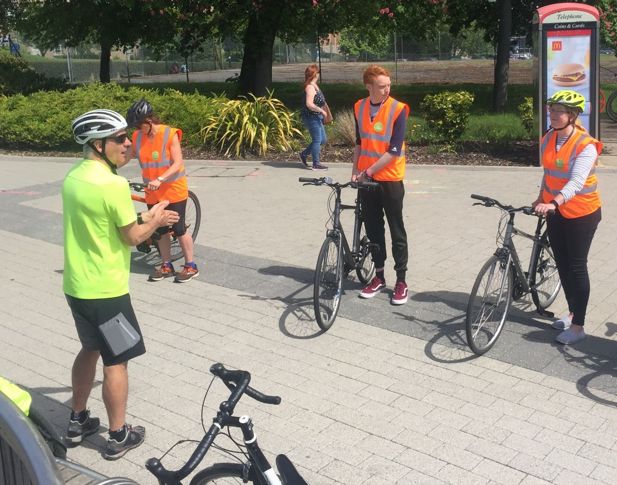Cycling Skills Training
 Paul training a group of UoB cyclists
Paul training a group of UoB cyclists
Q&A with Paul Robertshaw, Cycling Instructor
Many members of our university community would like to try cycling to work, but are concerned about safety on roads around campus. We have some of the best cycling infrastructure at our door, but cycling on roads will still form some part if not the majority of journeys for many.
This new academic year sees the start of the Green Heart Riders, a community cycling club for the university, supported by Cycling UK. The club exists to develop the confidence and skills of campus cyclists to ride their bikes for commuting, leisure and everyday life, starting with cycling skills training at three different competency levels.
Here we catch up with the course instructor Paul Robertshaw. Cycling instructor and ride leader with over fifteen years’ experience and founder of Birmingham Running and Triathlon club, Paul is a passionate believer in cycling as everyday transport and a route to all-round fitness.
You’ll be leading cycling skills sessions at the start of term. What can staff and students expect?
Paul: The aim is to become more proficient cyclists. There will be three levels: basic skills, everyday skills and advanced skills. At all levels it will be about gaining confidence riding.
The basic skills sessions are for cyclists who can pedal and glide, and need to learn the right techniques for signalling, braking and choosing gears. These sessions will take place on the enclosed top deck of the Sport and Fitness car park. It’s the perfect environment: off-road and with the privacy to learn without feeling self-conscious.
What about the everyday and advanced skills sessions?
Paul: Everyday skills aims to equip riders for simple roads and junctions. We’ll touch on concepts like the primary and secondary road positions and how to communicate with other road users. The advanced skills session takes this to the next level and prepares cyclists for more roads and junctions.
We’ll also learn the basics of ensuring a bike is in good working order, and touch on route planning too. Most of all we are going to explore the enjoyment and freedom that riding a bike can offer in a big city such as Birmingham.
If you could teach someone new to cycling one thing, what would it be?
Paul: The ability to look behind them whilst maintaining control of a bike and the importance of planning a route. It takes practice!
Can I have two things? Route planning is essential, and it is so easy now. There is a plethora of apps and resources online to get started so it has never been easier. I use Garmin, which is high-end. Google Maps works fine. The best tip I have is to spend time talking to other cyclists, sharing routes and researching. I still unfold paper maps at the kitchen table to see how routes fit together. My brother spent 27 years in the army and this is his favourite quote: ‘Time spent in reconnaissance is seldom wasted’.
You are keen bike rider yourself, what makes you passionate about cycling as a mode of transport?
Paul: I could write a dissertation! It just is the answer to so many of the 21st century’s biggest challenges. Climate change, pollution, clean air, social deprivation, inactivity, obesity, you name it. And it is fun! Once you get confident and competent, that is. It is cheap, healthy, sustainable, and more than carbon neutral. Most of all it is just fun. Most people you talk to, once you get them to a point on the continuum of cycling, become passionate. It is rare that people get competent then don’t continue.
Many staff and students want to start cycling around campus but find the roads unsafe. What has got to change?
Paul: It is well worth planning routes and working out the safer routes. There is a perfectly adequate—not great, but adequate—network of segregated or safe routes that mean that anyone within three miles can cycle to campus without encountering difficult road conditions.
More segregated cycle routes will of course make a big difference. Month on month we are seeing more people ride on the A38 blue route. We are blessed with three of the best arteries in Birmingham—the canal towpath, A38 blue route and Rea Valley route—and there are perfectly good routes from Woodgate Valley, Harborne, Bournville, Moseley.
Finally, learning new skills on the bike, whether that’s the primary and secondary positioning, better bike handling or how to filter in traffic, breeds confidence to ride on our local roads, and that is what these skills sessions aim to achieve.